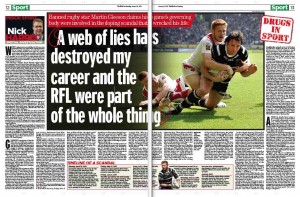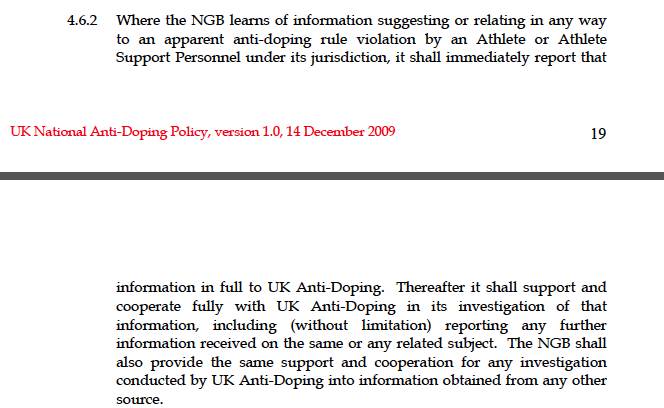By Nick Harris
SJA Internet Sports Writer of the Year.
15 January 2012
 The former Great Britain rugby league international Martin Gleeson has spoken today for the first time about the circumstances in which he came to fail a drugs test, and how more widespread use of a stimulant was covered up. His story, and a detailed breakdown of a highly complex case can be read in the Mail on Sunday (left). (Link to the online version here).
The former Great Britain rugby league international Martin Gleeson has spoken today for the first time about the circumstances in which he came to fail a drugs test, and how more widespread use of a stimulant was covered up. His story, and a detailed breakdown of a highly complex case can be read in the Mail on Sunday (left). (Link to the online version here).
The key details of an unprecedented scandal – which has already led to the former Hull FC chief executive James Rule and the former conditioning coach Ben Cooper being banned from the game – are as follows:
.
Drug use at Hull
At some point early last year, a significant number of players at Hull FC were taking a performance-enhancing drug, by mistake.
The full extent of the usage has never been established beyond doubt. Estimates vary from ‘seven or eight’ players (Cooper’s initial guess), to perhaps ‘the whole squad’ (James Rule’s initial fear). Beyond any doubt whatsoever, it was multiple players and names are known and a number have provided written statements to say they took the drug, by mistake.
Sean Long, the former England and GB star – and Gleeson’s best friend, was among those. So were other international players from more than one country.
The drug in question was methylhexanamine (MHA), a stimulant commonly used in medicine as a nasal decongestant, which typically provides a caffeine-like buzz to the user. It is a listed ingredient in a dietary supplement called OxyElite Pro, which was being used by Gleeson and other players. MHA is also known as 1,3 Dimethylamylamine and DMAA.
MHA is a ‘controlled’ substance and as such illegal for athletes to have in their bodies when competing.
Dozens of sportsmen globally have had bans as a result of MHA positives in recent years, often as a result of contaminated substances. British-based cases included rugby players Nico Steenkamp and Karea Wihongi, footballer Simon Mensing and shotputter Rachel Wallader.
There was no contamination issue in the Gleeson case; MHA was a listed ingredient in the product he took.
He took OxyElite Pro because it had been given to him by Long, who had checked it with Cooper before using it.
All athletes should check ingredients for themselves on all products they use but it is routine and normal in team sports to take the word of a coach or conditioner.
Cooper made a human error – albeit one with huge consequences – when he checked the OxyElite Pro for Long, and told Long it was safe to use.
But events were set in motion for a scandal – and a cover-up.
.
The failed test and the start of the cover-up
Gleeson tested positive for MHA after playing for Hull at Salford on Friday 13 May 2011. He was, in many ways, unlucky. It could have been any of the Hull players who had been using the supplement on or around match days and then been tested.
UK Anti-Doping, who police drug use in sport in the UK, made the necessary notifications about the positive test on Friday 3 June. That was the date that Hull knew, that Gleeson knew and that the game’s governing body, the Rugby Football League, knew.
On that same date, Gleeson, who was utterly shocked, worked out how he had tested positive, and the grim realisation dawned on Hull CEO James Rule that multiple players could have been, or were, using banned drugs.
Gleeson told Rule he got the drug from Long. Rule told Ralph Rimmer, the C.O.O of the RFL that information on Friday 3 June. The RFL’s head of anti-doping, Emma Rosewarne, also knew where the drug had come from on that Friday, and knew Gleeson was not the only Hull player who had used it.
These are all facts, unearthed by a later UKAD investigation into the case and the cover-up. The story in today’s MoS is informed by the full facts, many of which will probably never enter the public domain.
.
The lies begin
Hull had a crucial derby against Hull KR on the Sunday.
James Rule, and the RFL officials who knew about the case, had the option of telling UKAD all that they knew on that Friday.
In fact under the terms of the National UK Anti-Doping policy (NUKADP), the RFL should have been obliged to tell UKAD all the details they knew, immediately. The specific clause of the NUKADP that dictates this – and is applicable to all relevant RFL officials, is clause 4.6.2:
.
This is unequivocal.
There had been a anti-doping violation (Gleeson’s test).
The national governing body (NGB) was the RFL. And clause 4.6.2 obliged them to “cooperate fully with UKAD Anti-Doping in its investigation of that [positive result] information, including (without limitation) reporting any further information received on the same or any related subject.”
Hull and the RFL both knew information over and above the information about Gleeson on 3 June – and did not pass it to UKAD at that time.
In fact, Hull, supported by the RFL, made an immediate appeal to allow Gleeson to play in Hull derby on the Sunday – without mentioning Long or any other players had taken the OxyElite Pro.
Astonishingly, the appeal was successful and Gleeson, Long and others who had been using OxyElite Pro played in the Hull derby on 5 June.
And yet Hull and the RFL also both remained silent (to UKAD) on that wider info during a tribunal hearing against Gleeson on 9 June.
This was not accidental oversight: Gleeson’s initial defence on 9 June was a pack of lies constructed along with Rule and Cooper. When the lies were exposed, Gleeson rapidly came clean and helped UKAD prosecute Rule and Cooper. His ban was commuted to 18 months for his assistance to UKAD in the case. Those prosecutions only ended in the past few weeks, leaving Gleeson free to tell his own story of how he was made the sole scapegoat.
.
What else could Hull and the RFL have done?
They could have told UKAD immediately all they knew.
They could have admitted they knew about Long, then Gleeson could have defended himself on the basis he got the drug from Long, and not as he and Rule initially claimed, by himself.
The risk to Rule was that by bringing Long’s name into the case at that stage, it would be clear the problem went beyond Gleeson.
Hull could have admitted that Cooper’s human error had led – by mistake – to a group of players using a banned substance. But that would have garnered global headlines.
So the whole thing was covered-up.
Until now.
The RFL insist they acted properly all the way through and a UKAD investigation into the matter concluded with no charges against the RFL for reasons that have not been explained, certainly never in public.
Gleeson is the first to concede he’s had a ‘bad boy’ reputation in the past and umpteen off-field problems.
One might argue that this made him an even easier scapegoat.
As and when UKAD elect to publish the full, unedited version of their massive investigation, that may become obvious.
.
2.20pm Update. RFL Statement
NB: includes quotes from Ralph Rimmer, who himself knew on 3 June about Sean Long giving Martin Gleeson the OxyElite Pro, because James Rule personally told him. Rimmer told UKAD this in his own words in oral testimony. Rimmer didn’t share the information about Long with UKAD at the time he knew it. And the Panel tribunal hearing went ahead without UKAD knowing Gleeson wasn’t alone in using the drug.
The RFL has today reaffirmed confidence in its actions during the recent doping investigation involving former Hull FC Chief Executive James Rule, former player Martin Gleeson and former conditioning coach Ben Cooper.
“We are clear that the governing body acted entirely appropriately throughout what was a long and complicated investigation involving UK Anti-Doping and a National Anti-Doping Panel,” said RFL Chief Operating Officer Ralph Rimmer.
“As part of their investigation, UK Anti-Doping received external legal advice which found that there was no evidence to suggest that anyone at the RFL was complicit in the giving of false evidence to the NADP, or knew at all that the evidence was false. It found that there was no case for anyone at the RFL to answer.”
The RFL will be making no further comment at this time.
.







